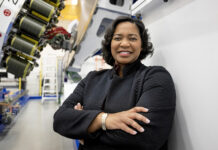Nuclear Power Gains Momentum at the United Nations Climate Change Conference in Azerbaijan
The global focus is increasingly shifting toward nuclear power as a viable solution for reducing carbon emissions, evident at the United Nations Climate Change Conference (COP29) held in Azerbaijan. During the event, representatives from various countries and industries outlined their strategies to utilize nuclear energy as a carbon-free power source. This move builds on the consensus achieved at the previous year’s climate summit, where there was a significant push to accelerate the adoption of nuclear technology.
The Importance of Nuclear Energy for Decarbonization
The world is striving to meet ambitious decarbonization goals by 2050, a target that necessitates a considerable expansion of nuclear power capacity. This was a key takeaway from the first Nuclear Energy Summit in March 2024 and further reinforced during the Global Stocktake at COP28. More than 20 countries have committed to tripling their nuclear capacity to meet these targets. However, achieving this expansion requires substantial investment, as highlighted by Rafael Mariano Grossi, the Director General of the International Atomic Energy Agency (IAEA). He emphasized the need for financial institutions to adapt to the evolving market demands, pointing out the growing interest and clear demand for nuclear energy. Mr. Grossi shared these insights at a significant event co-hosted by COP29 and the IAEA, which concentrated on financing low-carbon energy initiatives, including nuclear projects.
Key Figures and Discussions at COP29
The high-level event at COP29 gathered influential speakers such as Rafael Mariano Grossi, Parviz Shahbazov (Minister of Energy of Azerbaijan), Herbert Krapa (Deputy Minister of Energy of Ghana), Fatih Birol (Executive Secretary of the International Energy Agency), Francesco La Camera (Director-General of the International Renewable Energy Agency, IRENA), Tatiana Molcean (Executive Secretary of the United Nations Economic Commission for Europe, UNECE), Mark Bowman (Vice President for Policy and Partnerships at the European Bank for Reconstruction and Development, EBRD), Sama Bilbao y Leon (Director General of the World Nuclear Association), and Seth Agbeve (Director of Renewable Energy at the Ministry of Energy of Ghana).
These discussions underscored the strategic role that nuclear energy is expected to play in achieving a sustainable energy future. The event underscored collaborations and partnerships aimed at advancing nuclear energy and other renewable energy sources.
Azerbaijan’s Commitment to Nuclear Energy
In a noteworthy development, a memorandum of understanding was signed between the IAEA and Azerbaijan. This agreement commits the IAEA to assist Azerbaijan in building its energy planning capabilities, including conducting joint analyses under the Atoms4NetZero initiative. This initiative focuses on evaluating how nuclear energy can contribute to Azerbaijan’s clean energy transition. Azerbaijan’s Minister of Energy, Parviz Shahbazov, stressed the significance of nuclear energy for the nation’s energy strategy, indicating that nuclear power could become a vital component of Azerbaijan’s clean energy mix.
Collaboration and Agreements to Foster Nuclear Energy
During COP29, several cooperation agreements were signed to further nuclear energy initiatives. Notably, the IAEA and LinkedIn have agreed to collaborate on enhancing capacity in the nuclear sector. This partnership will offer training, provide data insights, and facilitate networking opportunities, particularly supporting women in the nuclear field. Furthermore, the IAEA and IRENA have committed to joint missions, training programs, data sharing, and case studies, all aimed at advancing energy planning and achieving clean energy objectives.
Moreover, the European Bank for Reconstruction and Development (EBRD) and the IAEA have agreed to cooperate on various aspects, including nuclear safety, decommissioning, environmental remediation, and the broader implementation of nuclear energy. This collaboration signifies a concerted effort to bring nuclear energy to the forefront of global energy strategies, supporting the transition toward net-zero emissions.
Understanding the Broader Context of Nuclear Energy
Nuclear energy is often seen as a controversial topic due to concerns about safety, radioactive waste, and the high costs associated with building nuclear power plants. However, it is crucial to recognize that nuclear power is a low-carbon energy source capable of providing large-scale, reliable electricity. Unlike wind or solar energy, nuclear power plants can operate continuously, supplying a stable base load of electricity to the grid without the variability inherent in other renewable sources.
To address safety concerns, modern nuclear reactors are designed with advanced safety features and stringent regulatory oversight. Additionally, new technologies such as small modular reactors (SMRs) are being developed to make nuclear power more flexible, safer, and cost-effective. SMRs are smaller than traditional reactors and can be deployed in locations that might not be suitable for larger plants, potentially playing a significant role in the future energy landscape.
Global Reactions and Perspectives
The renewed focus on nuclear energy has sparked varied reactions globally. Proponents argue that nuclear power is essential for a balanced energy strategy, providing a consistent power supply while contributing to carbon reduction goals. Critics, however, remain skeptical, pointing to past nuclear accidents and unresolved issues surrounding nuclear waste management.
Despite these challenges, the push for nuclear energy continues to gain momentum, driven by the urgent need to address climate change. As countries seek to diversify their energy sources and reduce carbon emissions, nuclear power is increasingly being recognized as a critical component of a sustainable energy strategy.
Conclusion: A Path Toward a Sustainable Future
The discussions and agreements at COP29 highlight the pivotal role nuclear energy is expected to play in global efforts to combat climate change. By fostering international cooperation and securing necessary investments, the expansion of nuclear power capacity can significantly contribute to achieving net-zero emissions by 2050. As nations like Azerbaijan explore incorporating nuclear energy into their energy mixes, the world continues to take steps toward a more sustainable and resilient energy future.
For further information on these initiatives and the role of nuclear energy in achieving global energy goals, you can explore resources from the International Atomic Energy Agency and other partner organizations.
For more Information, Refer to this article.


































